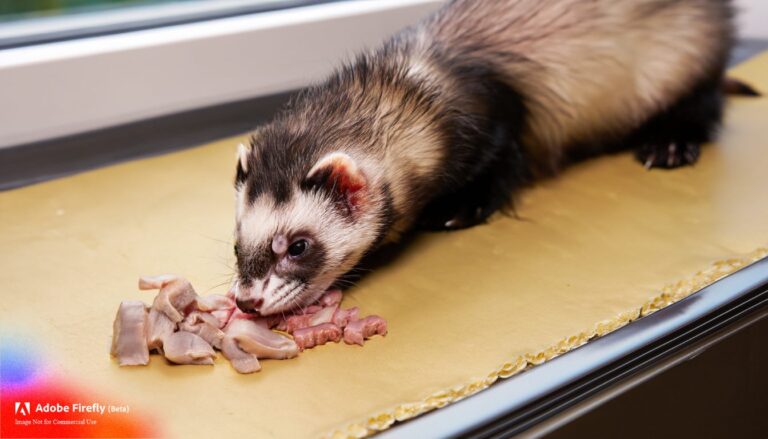
Are you considering getting a ferret as a pet? If so, you may be wondering about the cost of owning one and where you can find a furry friend to bring home. In this article, I’ll break down the various factors that contribute to the cost of a ferret and provide some valuable insights on where you can buy one.
When it comes to the cost of a ferret, there are several factors to consider. The price can vary depending on factors such as the breed, age, and location. Additionally, you’ll need to factor in the initial setup costs, including a cage, bedding, and toys, as well as ongoing expenses like food, veterinary care, and grooming. By understanding the different aspects of ferret ownership costs, you’ll be better prepared to make an informed decision.
Now that you have an idea of what goes into the cost of a ferret, let’s explore the different options for where to buy one. From pet stores to breeders and adoption centers, there are various places where you can find a ferret. Each option has its pros and cons, so it’s important to do your research and consider factors such as the reputation of the seller, the health and history of the ferret, and any additional services or support they may offer.
Factors Affecting the Cost of a Ferret
When it comes to the cost of owning a ferret, there are several factors that can influence the price. Here are some important factors to consider:
1. Breed: The breed of the ferret can have a significant impact on the cost. Some breeds, such as the rare and exotic ones, can be more expensive compared to the more common ones.
2. Age: The age of the ferret is another factor that can affect the cost. Generally, younger ferrets tend to be more expensive than older ones. This is because younger ferrets are in higher demand and require more care and attention.
3. Location: The location where you live can also play a role in the cost of a ferret. In some areas, where there is high demand and limited availability, the price can be higher. Conversely, in areas where there is a surplus of ferrets, the cost may be lower.
4. Health and Genetics: Ferrets with good health and desirable genetics may come with a higher price tag. These ferrets often undergo health checks and come from reputable breeders or sellers.
5. Lineage and Pedigree: Ferrets with a known lineage or pedigree can also be more expensive. This is because their ancestry and bloodline can have an impact on their traits and temperament.
It’s important to remember that the cost of a ferret is not just the initial price. There are also ongoing expenses to consider, such as food, bedding, toys, and veterinary care. Planning for these costs is essential to ensure that you can provide for your furry friend’s needs.
Now that we have explored the factors that can affect the cost of a ferret, let’s move on to the next section and discuss where you can buy one.
Initial Setup Costs
When bringing a new ferret into your home, there are several initial setup costs to consider. These costs can vary depending on your location and the type of ferret you choose, but it’s important to budget for them before making a purchase. Here are some key expenses to think about:
- Ferret Cage: A proper cage is essential for your new furry friend. Look for a spacious and sturdy cage with multiple levels for climbing and exploration. The cost of a ferret cage can range from $100 to $300 depending on the size and quality.
- Bedding and Litter: Ferrets need comfortable bedding and a designated litter area. Consider using ferret-safe bedding materials such as blankets, towels, or fleece liners. You’ll also need to purchase a litter box and specialized ferret litter. Budget around $50 to $100 for these items.
- Toys and Enrichment: Ferrets are highly active animals and need plenty of mental stimulation. Invest in toys, tunnels, and puzzle feeders to keep your ferret entertained. Plan to spend around $50 to $100 on various toys and enrichment items.
- Food and Water Bowls: Choose heavy, non-tippable bowls made of ceramic or stainless steel to prevent spills. It’s important to provide fresh water and a balanced diet for your ferret. Budget around $20 to $50 for food and water bowls.
- Ferret-Proofing Supplies: Ferrets are curious and can easily get into mischief. Ensure a safe environment by purchasing baby gates, cabinet locks, and electrical cord protectors. These supplies could cost around $50 to $100.
In total, the initial setup costs for a ferret can range from $270 to $650 depending on the items you choose and where you purchase them. Keep in mind that these costs may vary, and it’s important to research prices from different sources.
Remember, these initial setup costs are just the beginning. Ongoing expenses such as food, bedding, toys, and veterinary care should also be factored into your budget. Planning ahead will help ensure that you can provide a comfortable and enriching environment for your new ferret.
Ongoing Expenses of Ferret Ownership
One of the most important factors to consider when looking into owning a ferret is the ongoing expenses associated with their care. These costs can add up quickly, so it’s important to be prepared. Here are some of the key ongoing expenses to keep in mind:
- Food: Ferrets have very specific dietary needs, and providing them with a balanced and nutritious diet is essential for their health. High-quality ferret food can be quite expensive, so it’s important to budget for this expense. Additionally, ferrets have a fast metabolism and require frequent meals throughout the day, which means you’ll need to factor in the cost of regular feedings.
- Bedding: Ferrets need a comfortable and safe place to sleep, and providing them with suitable bedding is important. This can include materials such as fleece blankets, towels, or specially designed bedding for ferrets. It’s important to regularly clean and replace the bedding to maintain a clean and healthy environment for your ferret.
- Toys and Enrichment: Like any other pet, ferrets need mental and physical stimulation to keep them happy and entertained. Investing in toys and enrichment activities for your ferret is important to prevent boredom and promote their overall well-being. This can include items such as tunnels, balls, puzzle toys, and interactive playtime with their owners.
- Veterinary Care: Just like any other pet, ferrets require regular veterinary care to ensure their health and wellbeing. This includes vaccinations, check-ups, and preventive treatments for parasites. It’s important to budget for these routine medical expenses, as well as for any unexpected veterinary visits that may arise.
- Grooming: Ferrets require regular grooming to keep their fur and skin healthy. This can include brushing, nail trims, and occasional baths. It’s important to budget for grooming supplies or to consider the cost of professional grooming services if you’re unable to do it yourself.
- Emergency Fund: It’s always a good idea to set aside some money for emergencies. While we hope that nothing happens to our beloved pets, unexpected medical or other expenses can arise. Having an emergency fund can provide peace of mind and ensure that you can provide your ferret with the care they need in case of an unforeseen event.
Where to Buy a Ferret
When it comes to buying a ferret, there are a few options to consider. It’s important to make an informed decision and choose a reputable source that prioritizes the well-being of these adorable and mischievous pets.
Here are some common places where you can buy a ferret:
- Ferret Breeders: Working with a reputable ferret breeder can be a great option. Breeders carefully select and pair ferrets to produce healthy offspring with desirable traits. They typically provide detailed information about the ferret’s lineage and genetics, giving you better insight into the potential health and temperament of your new furry friend.
- Rescue Shelters: If you’re looking to give a ferret a second chance, consider adopting from a rescue shelter. Many shelters have ferrets that are in need of loving homes. Adopting a ferret not only saves a life but also helps support the efforts of these organizations.
- Pet Stores: Pet stores may also have ferrets available for purchase. However, it’s crucial to research the store’s reputation and ensure they follow ethical practices. Look for stores that prioritize the well-being and health of their animals, providing proper care and housing.
- Online Platforms: There are various online platforms where individuals and breeders advertise ferrets for sale. While it can be convenient to search for a ferret online, it’s important to proceed with caution. Ensure you thoroughly research the seller, ask for detailed information, and, if possible, visit the ferret in person before making a final decision.
Remember, it’s essential to prioritize the welfare of the ferret and ensure you choose a reliable source. Take the time to consider your options and make an informed decision when buying a ferret. By doing so, you’ll be setting yourself up for a rewarding and fulfilling experience with your new furry companion.
Pet Stores
When it comes to buying a ferret, pet stores are a popular option for many people. These stores provide a convenient and accessible way to find and purchase a ferret. However, it is important to approach the process with caution and do your research before making a decision.
Here are a few important things to consider when buying a ferret from a pet store:
- Reputation: Not all pet stores are created equal. Look for a reputable pet store that has a solid reputation for selling healthy and well-cared-for animals. Read reviews, ask for recommendations, and visit the store in person if possible. A reputable pet store will prioritize the welfare of their animals and provide proper care and socialization.
- Health guarantee: Check if the pet store offers any health guarantees for the ferrets they sell. A responsible store should provide a warranty or guarantee that covers any genetic or health issues that may arise in the first few weeks or months of owning the ferret.
- Source of ferrets: Find out where the pet store obtains their ferrets from. Ideally, they should work with reputable breeders who prioritize the health and well-being of their animals. Avoid purchasing from stores that obtain their ferrets from unethical or inhumane sources.
- Interaction and socialization: Determine how the ferrets are cared for and socialized at the pet store. Do they have sufficient space, toys, and opportunities for interaction? A well-socialized ferret is more likely to adjust to their new home and bond with their new owner more easily.
Remember, buying from a pet store is a personal choice, and it’s important to feel comfortable and confident in your decision. Take the time to ask questions, gather information, and ensure the well-being of the ferrets you are considering bringing into your home.
Breeders
When it comes to buying a ferret, one option is to purchase from a breeder. Working with a reputable breeder can have its advantages. Here’s what you need to know:
- Quality and Guarantee: Breeders often produce ferrets with known lineages or pedigrees. This means you have a better idea of their health and genetic background. Reputable breeders will usually offer a health guarantee for their ferrets, giving you peace of mind.
- Knowledgeable Advice: Breeders have extensive knowledge about ferret care and behavior. They can provide valuable guidance and support, especially if you are a first-time ferret owner. They can help you choose a ferret that suits your lifestyle and answer any questions you may have.
- Health Monitoring: Good breeders take pride in maintaining the health of their ferrets. They conduct regular health check-ups, provide vaccinations, and ensure the ferrets are well-socialized. By working with a breeder, you can have confidence in the health and well-being of the ferret you bring home.
- Socialization: Ferrets that come from reputable breeders usually receive early socialization. This means they are exposed to different people, environments, and experiences during their early months. Socialization is crucial for a ferret’s development and can result in a more well-adjusted pet.
While working with a breeder offers many benefits, it’s important to exercise caution and do your research. Look for breeders who prioritize the welfare of their ferrets and are committed to responsible breeding practices. Beware of unethical breeders who prioritize profit over the health and well-being of their animals.
Buying a ferret from a reputable breeder can be a great option for those looking for a specific breed or who want the assurance of a healthy and well-cared for pet. However, remember to do your due diligence and choose a breeder who prioritizes the well-being of their animals.
Adoption Centers
When considering where to buy a ferret, adoption centers are an excellent option to explore. These centers specialize in finding homes for animals in need, including ferrets. Adopting a ferret from a reputable adoption center can be a rewarding experience both for you and the ferret.
Here are a few reasons why adoption centers are worth considering:
- Saving a life: By adopting from an adoption center, you are providing a loving home to a ferret that may have been abandoned or surrendered by its previous owner. You have the opportunity to make a significant difference in the life of a deserving animal.
- Affordability: The cost of adopting a ferret from an adoption center is usually lower than purchasing one from a breeder. Adoption fees typically cover essential veterinary care, such as spaying/neutering and vaccinations, saving you money in the long run.
- Support and guidance: Adoption centers often provide valuable support and guidance to help you care for your new ferret. They can provide information on proper diet, housing, and overall ferret care. Plus, you’ll have access to experienced staff who can answer any questions you may have.
- Screening process: Adoption centers usually have a thorough screening process to ensure that the ferrets are placed in suitable and loving homes. This can give you peace of mind that the ferret you’re adopting will be well taken care of.
- Research: Do some online research to find adoption centers in your area or within a reasonable distance. Look for reviews or recommendations from other pet owners to gauge the center’s reputation.
- Visit the center: Once you find a potential adoption center, visit them in person if possible. This will allow you to see the conditions in which the ferrets are kept and interact with the staff to get a better sense of their knowledge and passion for animal welfare.
- Ask questions: Don’t be afraid to ask the staff questions about the ferrets available for adoption, their history, and any medical conditions they may have had. It’s important to gather as much information as possible to make an informed decision.
Remember, adopting a ferret from an adoption center not only provides a loving home for a deserving animal but also contributes to reducing the number of ferrets in need. It’s a win-win situation for both you and the furry friend you welcome into your home.
Factors to Consider when Choosing a Seller
When it comes to purchasing a ferret, it’s important to choose the right seller. Here are several factors to consider before making your decision:
Reputation and Experience
Reputation matters. Look for a seller who has a solid reputation in the ferret community. Read reviews, ask for recommendations, and research their background. Experience is key – a reputable seller will demonstrate knowledge and expertise in caring for ferrets.
Health and Lineage
The health and lineage of a ferret are important considerations. A responsible seller will provide detailed health records and ensure that the ferret has received necessary vaccinations. Knowing the ferret’s lineage can help prevent potential genetic health issues.
Socialization and Handling
Ferrets are social creatures and require proper socialization from an early age. A good seller will ensure that the ferret has been handled regularly and exposed to different environments and situations. They should be able to provide information on the ferret’s socialization process and offer guidance on how to continue the socialization at home.
Support and Advice
Choose a seller who offers ongoing support and advice. A reputable seller will be available to answer your questions, provide guidance on ferret care, and address any concerns that may arise. They should be committed to the well-being of the ferret even after the sale has been made.
Pricing and Transparency
While cost shouldn’t be the sole determining factor, it’s important to consider the pricing. Compare prices from different sellers to get an idea of the average cost. However, be cautious of extremely low prices, as they may indicate poor breeding practices or health issues.
Transparency is also crucial. A trustworthy seller will be upfront about any known health issues or behavioral concerns about the ferret. They should be willing to provide all the necessary information to make an informed decision.
Remember, choosing the right seller is crucial to ensure that you bring home a healthy and well-socialized ferret. Take the time to research and visit different sellers, ask questions, and consider all the factors mentioned above.
Conclusion
Choosing the right seller when purchasing a ferret is crucial to ensure a healthy and happy pet. Throughout this article, we have discussed several important factors to consider in order to make an informed decision.
Reputation and experience are key when selecting a seller. Look for someone with a solid track record and positive reviews from previous customers. A knowledgeable and experienced seller will be able to provide you with the necessary information and guidance to care for your ferret properly.
Health and lineage should also be taken into account. It is important to choose a seller who provides detailed health records and vaccinations for their ferrets. This will give you peace of mind knowing that your new pet has been well taken care of.
Socialization and ongoing support are crucial for the well-being of your ferret. A good seller will ensure that the ferrets have been properly socialized and will offer support and advice even after the purchase.
Pricing and transparency should also be considered. While it is important to compare prices, be cautious of extremely low prices as they may indicate underlying health or behavioral issues. Transparency regarding any known issues is essential.
Take the time to research and visit different sellers. Consider their reputation, knowledge, health records, socialization efforts, ongoing support, and pricing. By considering all these factors, you can find a reputable seller who will provide you with a healthy and well-adjusted ferret.






